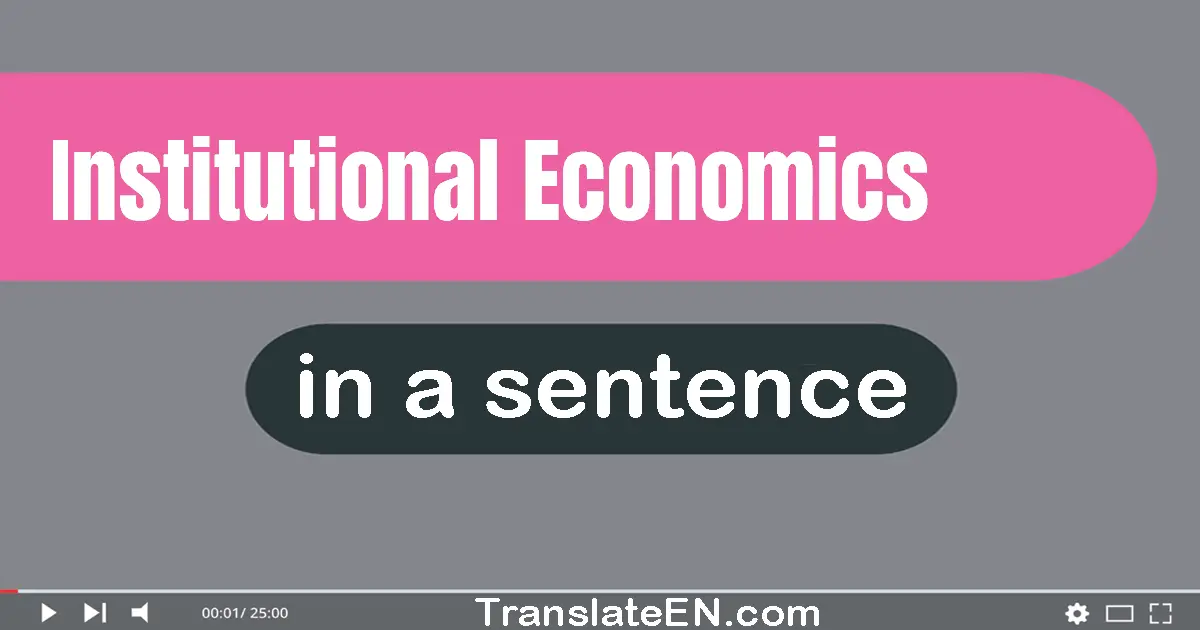Institutional Economics in a sentence

(1) Many economists credit John Kenneth Galbraith with shaping the field of institutional economics.
Institutional Economics meaning
Institutional economics is a branch of economics that focuses on the role of institutions in shaping economic behavior and outcomes. It examines how formal and informal rules, norms, and organizations influence economic activities and the functioning of markets. If you are looking to incorporate the term "institutional economics" into your writing, here are some tips on how to use it effectively in a sentence:
1. Define the term: Begin by providing a brief explanation of what institutional economics entails.
For example, "Institutional economics, a field of study within economics, explores the impact of institutions on economic behavior and market functioning."
2. Contextualize the concept: To help readers understand the relevance of institutional economics, provide some background information or examples. For instance, "Institutional economics sheds light on how government regulations, property rights, and social norms shape economic decision-making and influence market outcomes."
3. Highlight its interdisciplinary nature: Institutional economics draws from various disciplines, such as sociology, political science, and law. Emphasize this interdisciplinary aspect to showcase the breadth of its scope.
For example, "Institutional economics integrates insights from sociology, political science, and law to analyze the interplay between institutions and economic systems."
4. Discuss key theorists: Mention prominent scholars or economists who have contributed to the development of institutional economics. This demonstrates your familiarity with the field and adds credibility to your writing. For instance, "Institutional economics owes much of its foundation to the works of Douglass North, Ronald Coase, and Oliver Williamson, who received Nobel Prizes for their contributions to the field."
5. Provide real-world examples: Illustrate the application of institutional economics by incorporating specific cases or examples. This helps readers grasp the practical implications of the concept. For instance, "Institutional economics can be observed in action when analyzing the impact of labor laws on employment practices or the role of financial regulations in shaping banking behavior."
6. Discuss current debates or controversies: Institutional economics is a dynamic field with ongoing debates and discussions. Engage with these debates to demonstrate your understanding of the subject matter.
For example, "One ongoing debate within institutional economics revolves around the effectiveness of formal institutions, such as legal frameworks, versus informal institutions, such as cultural norms, in shaping economic behavior."
7. Connect to broader economic theories: Relate institutional economics to other economic theories or frameworks to showcase its place within the larger discipline. For instance, "Institutional economics complements neoclassical economics by highlighting the importance of institutions in overcoming market failures and promoting economic development."
8. Conclude with a summary or reflection: Wrap up your sentence by summarizing the main points or offering a reflection on the significance of institutional economics.
For example, "Institutional economics provides a valuable lens through which to understand the complex interactions between institutions, individuals, and markets, offering insights into how societies can design effective economic systems." Remember, the key to effectively using the term "institutional economics" in a sentence is to provide a clear definition, offer context, and demonstrate your understanding of the field's key concepts and debates. By following these tips, you can incorporate the term seamlessly into your writing and enhance your readers' comprehension.
The word usage examples above have been gathered from various sources to reflect current and historical usage of the word Institutional Economics. They do not represent the opinions of TranslateEN.com.
